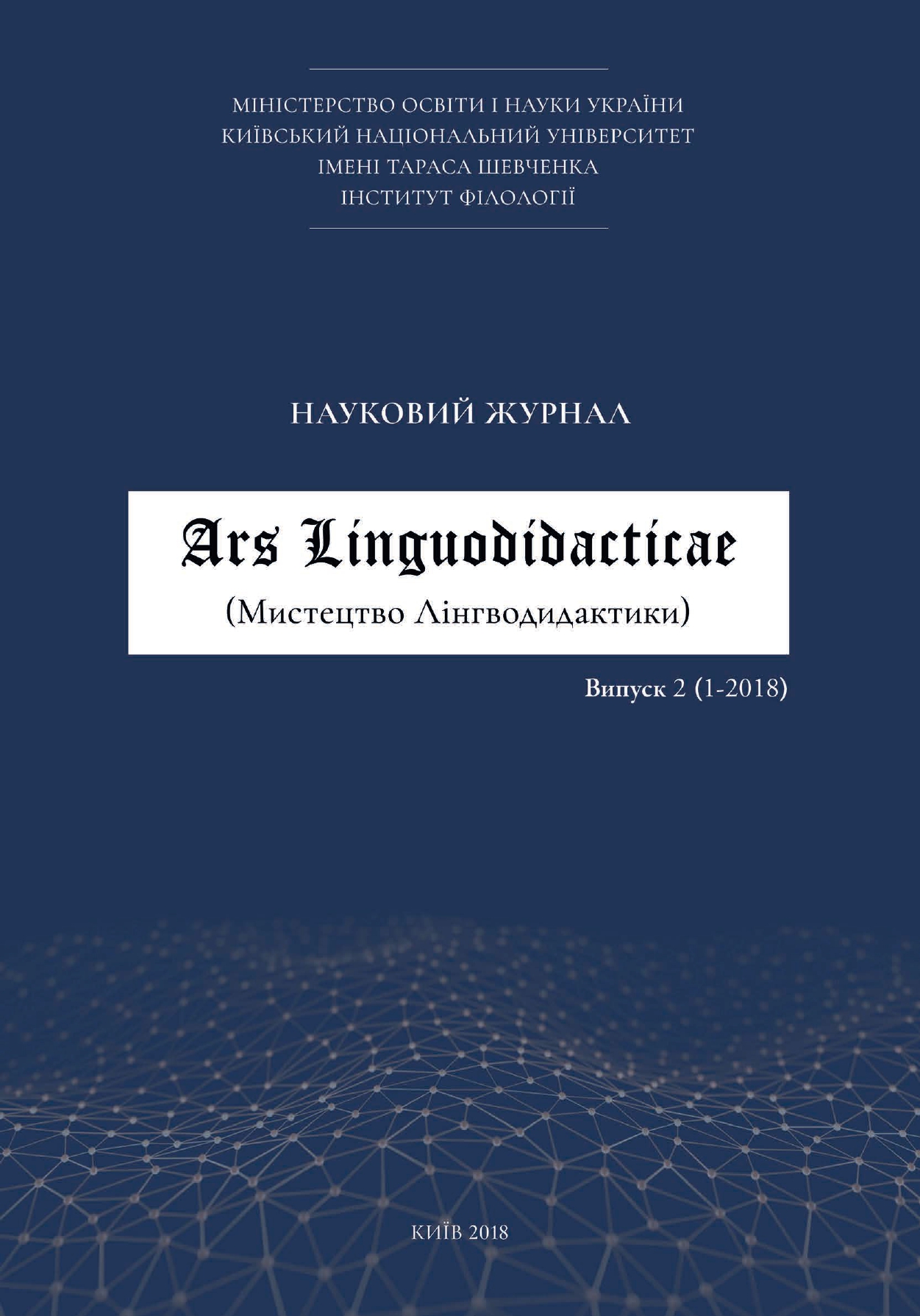ОСОБЛИВОСТІ ОРГАНІЗАЦІЇ ПРОЦЕСУ НАВЧАННЯ МОНОЛОГІЧНОГО МОВЛЕННЯ СТУДЕНТІВ СПЕЦІАЛЬНОСТІ «ПРАВО» НА ЗАСАДАХ ДИФЕРЕНЦІЙОВАНОГО ПІДХОДУ
DOI:
https://doi.org/10.17721/2663-0303.2018.2.10Ключові слова:
підсистема вправ та завдань, усне монологічне мовлення, диференційований підхід, рівень самостійності, етапність у формуванні монологічних умінь, мовленнєва компетентність, професійне спілкуванняАнотація
У статті розглядаються особливості навчання усного монологічного мовлення студентів спеціальності «Право». Обґрунтовано, що навчання англійського усного монологічного мовлення майбутніх правовиків відбувається у три етапи – дотекстовий, текстово-репродуктивний, продуктивний за допомогою спеціально розроблених вправ і завдань, які диференціюються у групах з різним рівнем самостійності за такими критеріями: участь викладача, ступінь автономності студентів у вирішенні завдань та доборі додаткових джерел.
Посилання
Agasieva, I.R. (2009). Obuchenie informativnomu chteniu spetsialnukh tekstov v mnogonatsionanoi auditoria tekhnicheskogo vusa (Агасиева И. Р. Обучение информативному чтению специальных текстов в многонациональной аудитории технического вуза: На материале английского языка). Diss. Makhachkala, Print.
Chechik, I.V. (2015). Realizatsiya differentsyrovanogo podkhoda k obucheniyu RKI s uchetom individualno-psikhologicheskikh kharakteristic uchaschikhsia (Чечик И.В. Реализация дифференцированного подхода к обучению РКИ с учетом индивидуально- психологических характеристик учащихся). Diss. Saint Petersburg. Print.
Druzhchenko, T.P. (2017). English for Law and Communication – Irpin: UDFSU.
Zabolotna, М.І. (2015). Metodyka navchnnia anhlomovnukh publitsystychnykh tekstiv starshoklasnykiv v umovakh profilnogo navchannia (Заболотна М. І. Методика навчання аудіювання англомовних публіцистичних текстів старшокласників в умовах профільного навчання). Diss. Kyiv. Print.
Zadorozhna, І.P. (2012). Model organizatsii samostiinoi roboty maibutnikh uchyteliv z ovolodinnia anhlomovnoyu komunikatyvnoyu kompetentsiyeyu (Задорожна І.П. Модель організації самостійної роботи майбутніх учителів з оволодіння англомовною комунікативною компетенцією). Naykovi Zapysky Ternopilskogo Natsionalnogo Pedagogichnogo Universytetu Imeni Volodymyra Hnatiuka). – Ternopil. – №2. – pp. 66–72. Print.
Zaitseva, I.A. (2007). Tekhnologia urovnevoi differentsiatsii kak sredstvo formirovania professionalnoi inoyasychnoi kommunikativnoi kompetentnosti studentov tekhnicheskogo vuza (Зайцева И.А. Технология уровневой дифференциации как средство формирования профессиональной иноязычной коммуникативной компетентности студентов технического вуза). Diss. Samara. Print.
Kuznetsovа, N.Yu. (2014). Sistema upravenia differentsurovannum obucheniem angliiskomy yazyku studentov neyazykovogo vuza v usloviakh neodnorodnosti uchebnykh grup (Кузнецова Н.Ю. Система управления дифференцированным обучением английскому языку студентов неязыкового вуза в условиях неоднородности учебных групп). Diss. Saint Petersburg. Print.
Lobashova, S.М. (2010). Differentsirovannyi podkhod k obucheniu studentov monologicheskoi rechi s uchetom lichnostno-tipologicheskikh osobennostei subyiktnoi regyliatsii na primere inostrannogo yazyka (Лобашова С.М. Дифференцированный подход к обучению студентов монологической речи с учетом личностно-типологических особенностей субъектной регуляции). Diss. Ulianovsk. Print.
Rozhneva, Е.М. (2009). Osobennosti obucheniya inoyazychnomu obscheniyu studentov tekhnicheskogo vuza (Рожнёва Е.М. Особенности обучения иноязычному общению студентов технического вуза). Diss. Kemerovo, Print.
Schoseva, Е.P. (1991). Differentsirovannyi podkhod k obucheniyu monologicheskoi rechi na pervom etape neyazykovogo vuza (Angliiskii yazyk) (Щосева Е.П. Дифференцированный подход к обучению монологической речи на первом этапе неязыкового вуза: (английский язык). Diss. Moscow. Print.
##submission.downloads##
Опубліковано
Як цитувати
Номер
Розділ
Ліцензія
Авторське право (c) 2018 Тетяна Дружченко

Ця робота ліцензується відповідно до Creative Commons Attribution-ShareAlike 4.0 International License.
Ця робота ліцензується відповідно до Creative Commons Attribution-NonCommercial 4.0 International License.
Політика охорони авторських прав відповідно до умов ліцензії: Creative Commons Attribution-NonCommercial (Атрибуція-Некомерційне використання) 4.0 Міжнародна (CC BY-NC 4.0).
Автори, що публікують свої статті в журналі "Ars Linguodidacticae" (журналі відкритого доступу) зберігають за собою такі права:
- Автори зберігають за собою права на авторство своєї статті та надають журналу "Ars Linguodidacticae" право першої публікації рукопису своєї статті на умовах ліцензії Creative Commons (CC BY-NC 4.0) Attribution License, яка дозволяє іншим особам вільно розповсюджувати опубліковану роботу з обов'язковим посиланням на автора оригінальної роботи та першу оригінальну публікацію в журналі "Ars Linguodidacticae". Інформація про збереження права на авторство надається на титульній сторінці статті.
- Автори зберігають за собою право укладати окремі угоди на неексклюзивне розповсюдження своєї статті у тому вигляді, в якому вона була опублікована в журналі "Ars Linguodidacticae" (наприклад, розміщувати статтю в електронних бібліотеках, архівах та каталогах або публікувати у складі інститутських збірників та монографій), за умови обов'язкового повного посилання на першу оригінальну публікацію в журналі "Ars Linguodidacticae".
- Політика журналу "Ars Linguodidacticae" дає змогу та заохочує розміщення авторами в мережі Інтернет (наприклад в інститутському репозитарії або на персональному сайті) рукопису роботи як до її подання до редакції, так і під час її редакційного опрацювання, оскільки це сприяє продуктивній науковій дискусії та позитивно позначається на оперативності й динаміці цитування статті.
Редакція журналу зберігає за собою видавничі права на:
- зверстані оригінали статей та весь номер журналу;
- оформлення журналу, а також оригінальні ілюстративні та додаткові матеріали;
- репринтні перевидання журналу в друкованому та електронному вигляді.
Політика охорони авторських прав провадиться відповідно до умов ліцензії: Creative Commons Attribution-NonCommercial (Атрибуція-Некомерційне використання) 4.0 Міжнародна (CC BY-NC 4.0).
Для отримання додаткової інформації, будь ласка, прочитайте повний текст Публічної ліцензії CC BY-NC 4.0
Creative Commons Attribution-NonCommercial 4.0 International License.


